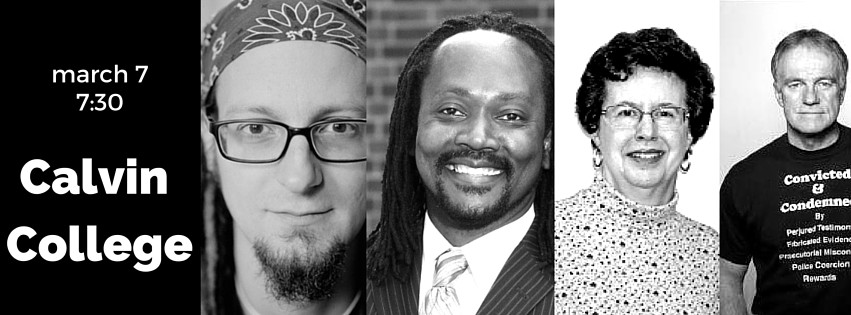On Monday, March 7, Calvin welcomed Randy Steidl, Bernard Dorsey, Gail Rice and Shane Claiborne to serve as panelists for a discussion on the death penalty.
Steidl had been falsely accused of murder and spent 12 years on death row. Reverend Dorsey is a theology professor at Western Seminary who provided a biblical history of the death penalty. Rice is a CRC member and activist who preached forgiveness since her brother was murdered. Claiborne is a Christian author who spoke about the disproportionate incarceration of the poor and people of color.
Steidl confided that he had blind faith in the justice system before it failed him. Falsely accused of the murder of a young couple, he was arrested and spent five years in prison before death row. During resultant trials, his pleas of innocence were disregarded, and he was sent to death row. Faced with an execution date, Steidl worked with lawyers on his case.
“After rotting in prison for years, I simply wanted to be put out of my misery,” Steidl explained. Finally, a new cop reopened the case. At the age of 57, Steidl was released due to reexaminations of the evidence and witnesses admitting to providing false testimony.
Steidl posed the following question to the audience: “If prosecutors are doing their job, why do they need absolute immunity?” He concluded that corruption within the system results in the death of many innocents.
Reverend Dorsey provided a theological history of the death penalty, pointing out that scripture is conditioned by our respective cultural realities. He emphasized that the death penalty was used both against and by Christians throughout history. After Jesus’ death, early Christians fought against the death penalty for about 300 years. However, Christians later advocated capital punishment for heretics, which Dorsey called “executing those who were already marginalized.”
For a contemporary example, Dorsey pointed out that people of color and the poor are disproportionately impacted by crime laws. Dorsey appealed to Christians’ responsibility to hold governmental authorities accountable, while also citing Romans 13, a reminder to submit to authorities.
Gail Rice’s brother Bruce was a cop who was killed while on duty. His sister responded to the tragedy by becoming an adult literacy volunteer in the Kent County Jail. She dedicated several years of her life to inmate ministry. Rice made it clear that her brother’s murder does not change the fact of the injustice of the system. She joined groups for victims’ families who oppose the state seeking retribution for victims’ families by way of the death penalty.
Some members got to know the murders of their loved ones and even forgive them. Rice confided that although she was furious at the man who murdered her brother, she knew that “he was made in God’s image.” Rice challenged her audience to continue loving the families of those who have been executed under the death penalty.
Lastly, Claiborne shared the story of Billy, a young man who committed murder and was later overcome with guilt. He begged forgiveness of the victim’s family, who not only forgave him, but also fought against the death penalty for Billy. Billy converted to Christianity, and when he was released, he became a pastor. “The Bible would be much shorter without grace,” Claiborne said. He then cited the example of David, and the grace God showed him despite his failings.
Claiborne then spoke about the disproportional incarceration of people of color. “We’re not killing the worst of the worst, we’re killing the poorest of the poor,” Claiborne declared.
However, he continued, Jesus overturned the “eye for an eye” policy through his life and ministry. “The closer we are to God, the less we want to throw stones at each other,” Claiborne explained. “Jesus is like the water poured on the electric chair. He short-circuits the ‘logical’ justice system.”
Claiborne concluded with a call for better forms of justice than execution.








